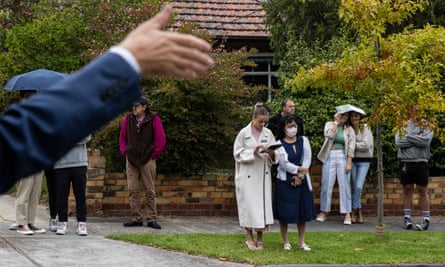When Sarah* (not her real name) stumbled upon her dream two-bedroom apartment in the eastern Sydney suburb of Edgecliff, she was hopeful she’d finally found something within her budget.
But at the inspection, the real estate agent immediately asked if she could stretch her price range. “They said it was listed for $1.1m because they wanted $1.2m, $1.3m,” she said.
“I was like ‘are you joking?’ It’s so demoralising.”
Sarah has visited almost three dozen properties in six months, and now instinctively questions every market price in case the agent is underquoting.
“I don’t want to waste my time getting emotionally invested, then have them say no,” she says. “You’ll often receive something in five days saying the price guide has been revised by $150,000. It’s pretty depressing.”
-
Sign up to receive an email with the top stories from Guardian Australia every morning
Real estate bodies have said underquoting remains “endemic” due to poorly regulated and underpoliced regulations.
The practice refers to posting listing prices substantially below market value in order to artificially attract more prospective buyers. And while it’s commonly identified as a symptom of buoyant markets, in falling markets it can make it even more difficult for buyers to estimate the real value of the property.
In May last year, NSW Fair Trading established a dedicated underquoting team to address “rising concerns” about the practice.
‘It’s been hell’: underquoting in hot housing market frustrates young buyersRead more
Since then, there have been 161 penalty infringement notices issued for underquoting and related offences. Each case was fined $2,200.
Agents in Sydney usually charge a commission of about 2% on sales , meaning the revenue on a median house price in the city of $1.6m would be about $32,000.
In 2020, 55 penalty notices were issued – including 25 issued after the underquoting team was established – from a total of 200 complaints.
“NSW laws regulating real estate agents have robust protections against misrepresentations about estimated selling prices and underquoting practices,” a spokesperson said.
Buyers agent Paul Mulligan says the regulations “aren’t effective, because it’s still happening”.
“[The fines] are nothing,” he says. “They need to name and shame agents. That’s the only thing that’ll change things.”
They need to name and shame agentsPaul Mulligan
Mulligan says he could “write a book” on the “hundreds of stories” of people being ripped off during his time in the industry, citing price discrepancies of as much as $500,000.
“Frustrated buyers are just fed up, they’re at a huge risk of making a big mistake,” he says.
Waqas Khawaja estimates he and his partner experienced underquoting half a dozen times at auctions across Sydney until finally securing a property in the south-west.
“You don’t realise what’s happened until you lose an auction by a quarter of a million,” he says.
“It’s gutting initially because as a first homebuyer, you make the emotional mistake of getting attached to a property.
“Realising that you never had a chance feels like a betrayal.”
Southern discomfort
Buyers advocate David Morrell says underquoting is even worse in Victoria, the “auction capital” of Australia.
From 1 July 2021 to 31 July 2022, Consumer Affairs Victoria (CAV) recorded 1,466 underquoting inquiries and complaints. During the same period, just 48 infringements and 171 official warnings were laid.
A spokesperson for Consumer Affairs Victoria said underquoting was “taken very seriously”. “Agencies found doing the wrong thing face penalties of more than $36,000 and a loss of sales commissions,” they said.
“Consumer Affairs Victoria undertakes year-round compliance activity, which includes auction monitoring, inspections, and investigating where necessary.”
But Morrell estimates 70% to 80% of properties in Victoria are underquoted.
In 2003, he became the first person to make a complaint for alleged underquoting to the Australian Competition and Consumer Commission (ACCC).
The Melbourne real estate agent was later found to have engaged in misleading or deceptive conduct by advertising prices of “600,000-plus” then “650,000-plus” for a house passed in at auction at $780,000. No penalty was laid.
“It’s an endemic part of the real estate practice,” he says. “People have been travelling three to four hours and the price is $400,000 more than they expected.
“It’s misleading, it’s a fraud on purchasers. And until significant penalties are handed out, regulations have been ineffective … if one does it, others have to follow.”
skip past newsletter promotion
Sign up to Morning Mail
Free daily newsletter
Our Australian morning briefing breaks down the key stories of the day, telling you what’s happening and why it matters
Enter your email address Enter your email address Sign upPrivacy Notice: Newsletters may contain info about charities, online ads, and content funded by outside parties. For more information see our Privacy Policy. We use Google reCaptcha to protect our website and the Google Privacy Policy and Terms of Service apply.
after newsletter promotion
The first underquoting law was issued in New South Wales in 2016, requiring the listing prices of residential property sales to align with market values or sellers’ valuations and cracking down on vague formats of listing prices like “600,000 and above”.
A year later, a similar law rolled out in Victoria.
A 2021 University of Melbourne study found the introduction of underquoting laws worked to align listing prices with market values, leading to a relative drop in auction sales prices of between 2% and 6% by cracking down on overbidding.
But Morrell said the laws had done little to dissuade estate agents and were rarely policed.
“There’s been underquoting of millions,” he says.
“I had one private sale listed at seven million, my buyer offered seven and they came back and said ‘the owner wants 8.8, she changed her mind’. It’s just rubbish … the grubby part of real estate that gets rubbed under the carpet.”
 View image in fullscreenProspective buyers at a property auction in Melbourne, the so-called ‘auction capital of Australia. Photograph: Diego Fedele/AAP
View image in fullscreenProspective buyers at a property auction in Melbourne, the so-called ‘auction capital of Australia. Photograph: Diego Fedele/AAP
No disincentive
Scott Aggett left residential sales in 2015, “disgruntled” after two decades in the industry. He’s since founded Hello Haus, a national negotiation service.
“I felt there was a better way to service buyers than the bullshit that went on,” he says. “I couldn’t take all that game playing … as an agent, I didn’t feel I could win unless I was lying.
“Nobody was coming to my open house for inspections because I was giving them the real prices, and it’s still rife in 2022.”
Hello Haus research found it takes an average of seven months for Australians to buy a property, with 45% of people reporting buyer remorse.
“Buyers spend 90 hours of their time [looking], inspect 300 properties, miss five times and on sixth the compromise and overpay,” Aggett says.
“Last week I had an agent who said openly … ‘we tell the owners if we quote within the 10% range we will have zero people through the open home’.
“They’re quoting up to 30% less to generate interest. The goal is to drive as much traffic to the property as you can to create competition and then drive that north. That’s openly being discussed.”
Last week, Aggett bought a property for a client at $3.75m, quoted at $3.2m.
“That’s consistent with what I have to deal with,” he says. “It’s a shitshow … and this happens every day across Australia.”
Aggett says fining estate agents $2,200 in NSW is little disincentive when commission will often be at least $30,000.
“They need to take entire fee off [the] agent … and agents need to have a strike-out policy,” he says. They should also openly disclose the agency agreement price. But it doesn’t seem to be on the cards at the moment, and it’s been going on for decades.”
The Real Estate Institute of Victoria (REIV) has lodged a submission to Consumer Affairs Victoria advocating for transparency reforms, including enhancing compulsory Statement of Information which estimates pricing for all residential properties.
“Part of what we’ve been pushing for … is to have regulation around pricing based on evidence,” the REIV’ chief executive, Quentin Kilian, says.
“At least then the buyer can say OK, it’s not comparative but here’s rationale. Real estate markets are so diverse, they move differently and have different pressures. You can’t have a one size fits all.”
Kilian says as the market begins to settle he expects to see “less discrepancies” in price estimates. But he maintains underquoting isn’t as common “as people would like to think”.
“It does occur from time to time,” he says.
“But in a really buoyant market it can often be simply the price has moved in the time it was first listed or the market has gotten excitable at an auction and it goes well beyond expectations.”





Leave a Reply
You must be logged in to post a comment.